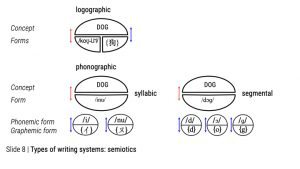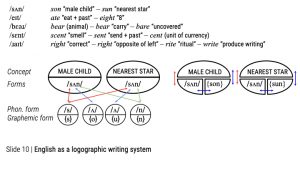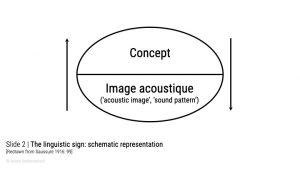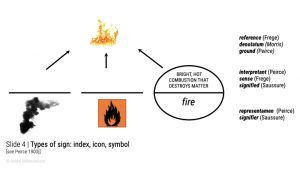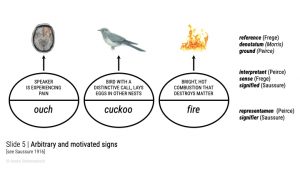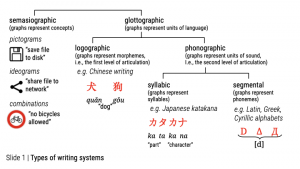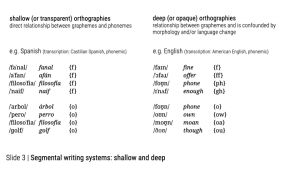These are suggestions as to how to continue with your studies for the next two semesters. They make sense and they ensure that you keep up with the credit points required to finish your studies in six semesters, but they are only suggestions – you are free to choose any other order of modules.
The linguistics, literature and culture classes are directed at all students of English philology, regardless of whether you are a future teacher or not. They do not include any teaching-specific content. However, feel free to ask your instructors whether they have any particular advice for future teachers – some (not all) of them will be happy to take your needs into account.
If you have questions or comments, please feel free to use the comment function!
Major (Hauptfach, 90 ECTS points)
Within the next two semesters, you should complete the following modules (if you are a future teacher, you must also take Fachdidaktik courses on which I will not comment here):
- AM 1: Surveying English Literatures
- AM 2: Introduction to Cultural Studies
- AM 3: Medieval English Literature
- AM 4: Levels of Linguistic Analysis
- AM 5: History of English
- Sprachpraxis: Oral and Writing Skills 1 (and maybe even Sprachpraxis: Oral and Writing Skills 2)
If you are a more of a history nerd (i.e., you love one or all of: Game of Thrones, Lord of the Rings, Vikings) and want to dive straight into the history of the English Language and Literature) I suggest the following:
| Semester | Modules | ||
|---|---|---|---|
| Summer 2021 | AM 3: Medieval English Literature | AM 5: History of English | Oral and Writing Skills 1* |
| Winter 2021/22 | AM 1: Surveying English Literatures | AM 4: Levels of Linguistic Analysis | AM 2: Intr. to Cultural Studies |
* If you have already taken Oral and Writing Skills 1, try to get into Oral and Writing Skills 2, or take Intro. to Cultural Studies in the Summer and OWS 2 in the Winter.
If you are more interested in the present and want to get a better idea of modern English language and literature, I suggest the following:
| Semester | Modules | ||
|---|---|---|---|
| Summer 2021 | AM 1: Surveying English Literatures | AM 4: Levels of Linguistic Analysis | Oral and Writing Skills 1* |
| Winter 2021/22 | AM 3: Medieval English Literature | AM 5: History of English | AM 2: Intr. to Cultural Studies |
* If you have already taken Oral and Writing Skills 1, try to get into Oral and Writing Skills 2, or take Intro. to Cultural Studies in the Summer and OWS 2 in the Winter.
If you are interested in the future (i.e., you love one of the following: Star Wars, The Expanse, Arrival), you’re largely out of luck, our cultural studies and literature professors don’t seem to be interested in the genre of Science Fiction, and linguists are very careful about predicting language change that has not happened yet. So just follow the instructions for students interested in the present (but tell me you are interested in the future of language, maybe we can get enough people together to start a discussion group…).
Core (Kernfach, 60 ECTS points)
With in the next two semesters, you should complete three of the following modules (if you are a future teacher, you must also take Fachdidaktik courses on which I will not comment here):
- AM 1: Surveying English Literatures
- AM 2: Introduction to Cultural Studies
- AM 3: Medieval English Literature
- AM 4: Levels of Linguistic Analysis
- AM 5: History of English
In addition, you must complete the module Sprachpraxis: Oral and Writing Skills 1.
After that, you have three semesters left to complete the other two Aufbau modules, one Vertiefung module and the Sprachpraxis modules Oral and Writing Skills 2 and Mediating Skills.
If you are a more of a history nerd (i.e., you love one or all of: Merlin, The Tudors, Monty Python and the Holy Grail) and want to dive straight into the history of the English Language and Literature) I suggest the following:
| Semester | Modules | |
|---|---|---|
| Summer 2021 | AM 5: History of English | Oral and Writing Skills 1* |
| Winter 2021/22 | AM 3: Medieval English Literature | AM 2: Intr. to Cultural Studies |
* If you have already taken Oral and Writing Skills 1, try to get into Oral and Writing Skills 2, or take Intro. to Cultural Studies in the Summer and OWS 2 in the Winter.
If you live in the present moment and want to get a better idea of modern English language and literature, I suggest the following:
| Semester | Modules | |
|---|---|---|
| Summer 2021 | AM 4: Levels of Linguistic Analysis | Oral and Writing Skills 1* |
| Winter 2021/22 | AM 1: Surveying English Literatures | AM 2: Intr. to Cultural Studies |
* If you have already taken Oral and Writing Skills 1, try to get into Oral and Writing Skills 2, or take Intro. to Cultural Studies in the Summer and OWS 2 in the Winter.
If you are interested in the future (i.e., you love one of the following: Star Trek, Blade Runner, Avatar), you’re largely out of luck, our cultural studies and literature professors don’t seem to be interested in the genre of Science Fiction, and linguists are very careful about predicting language change that has not happened yet. So just follow the instructions for students interested in the present (but tell me you are interested in the future of language, maybe we can get enough people together to start a discussion group…).
Minor (Nebenfach, 30 ECTS-Points)
You will only study two of the following modules, so choose carefully!
- AM 1: Surveying English Literatures
- AM 2: Introduction to Cultural Studies
- AM 3: Medieval English Literature
- AM 4: Levels of Linguistic Analysis
- AM 5: History of English
If you are more interested in literature and culture, I suggest the following:
| Semester | Modules |
|---|---|
| Summer 2021 | AM 1: Surveying English Literatures |
| Winter 2021/22 | AM 2: Intr. to Cultural Studies |
If you are more interested in language and culture, I suggest the following:
| Semester | Modules |
|---|---|
| Summer 2021 | AM 4: Levels of Linguistic Analysis |
| Winter 2021/22 | AM 2: Intr. to Cultural Studies |
If you are more interested in the past, I suggest the following (however, it will be difficult to follow these classes without any additional background in linguistics and literary studies, so you might want to switch to studying English as a Major):
| Semester | Modules |
|---|---|
| Summer 2021 | AM 5: History of English |
| Winter 2021/22 | AM 3: Medieval English Literature |
Primary School Teaching (Grundschulpädagogik, 30 ECTS points)
Grundschulpädagogik is a separate program of studies offered by the Dahlem School of Education, so please follow their rules and suggestions before you follow mine.
Roughly speaking, all Grundschulpädagogik students must complete the following modules (in addition to Fachdidaktik modules on which I will not comment here):
- AM 1: Surveying English Literatures
- AM 2: Introduction to Cultural Studies
- Oral and Writing Skills I plus
So I suggest that you focus on those modules for the next two semesters.
After that, if English is your Vertiefungsfach, you must complete all of the following:
- AM 3: Medieval English Literature
- AM 4: Levels of Linguistic Analysis
- AM 5: History of English
If English is not your Vertiefungsfach, you must choose two of them. The choice is up to you, but let me say that I strongly recommend that you choose AM 4: Levels of Linguistic Analysis as one of your modules – especially in primary school, it is important to have a good understanding of language structures, while the History of English and Medieval English Literature come up very rarely in this context! If you follow this recommendation, please let your instructor(s) in linguistics know that you are future primary school teachers, most of us will be happy to try to address your particular interests in some way!
